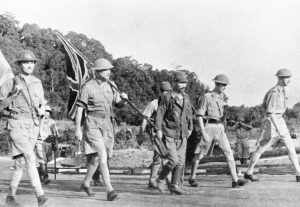75 Years On: What We Learn from the Fall of Singapore
This article first appeared as “Churchill and the Fall of Singapore” in The American Spectator, 22 February 2017.
“There is no worse mistake in public leadership than to hold out false hopes soon to be swept away…people can face peril or misfortune with fortitude and buoyancy, but they bitterly resent being deceived or finding that those responsible for their affairs are themselves dwelling in a fool’s paradise.” —Winston S. Churchill, 1950

On the last day of January, 1942, the British blew up Singapore’s central causeway to the mainland in a vain attempt to stop the onrushing Japanese. At nearby Raffles College, the Principal heard the bang. “What was that?” he asked a student, Lee Kuan Yew (later Singapore’s first prime minister). “That,” Lee claimed to have replied, “was the end of the British Empire.”
It certainly seemed so. Seventy-five years ago on February 15th, the surrender of 80,000 British to an smaller force of Japanese shocked the nation. The “impregnable fortress” had guns trained at the sea, but Japan had marched down the Malay Peninsula. Churchill—who had questioned Singapore’s gun defenses in the 1920s—called its surrender “the worst disaster and largest capitulation in British history.”
What Singapore Teaches
Modern leaders might consider the lessons offered by Churchill’s reaction to Singapore. Unlike certain recent assurances—the end of combat in Iraq, the draw-down in Afghanistan, the ISIS “JV team,” the outcome in Mosul—Churchill never failed to admit how serious things were.
“Tell the truth to the British people,” he exclaimed in 1932. “They may be a bit offended at the moment, but if you have told them exactly what is going on, you have insured yourself against complaints and reproaches which are very unpleasant when they come home on the morrow of some disillusion.” Singapore was indeed very bad; but there was a flip side.
Two certainties, Churchill wrote, emerged from Japan’s December 1941 attacks on Pearl Harbor and British East Asia. First, “a measureless array of disasters approached us in the onslaught of Japan.” Second, with America joining the Allies (“up to the neck and in to the death”) the Axis would inevitably be “ground to powder.”
With America in the fight, Churchill continued, Britons were free to think of something beside survival. Now every critic, “friendly or malevolent,” was “free to point out the many errors that had been made”—for war is, after all, “mainly a catalogue of blunders.” The combination of Allied doubts, the media’s “well-informed and airily detached criticism” and the “shrewd and constant girding” of politicians gave him the sense “of an embarrassed, unhappy, baffled public opinion, albeit superficial….”
“Embarrassed, unhappy and baffled, albeit superficial” is an apt description of today’s public mood as well. Modern threats, fortunately, are less frightening than those of 1942. But Churchill offers two simple strategies that today’s leaders might consider: Tell the truth, and cede no authority.
Tell the Truth
On 15 February 1942, Churchill broadcast “in the darkest terms…of a heavy and far-reaching military defeat….Other dangers gather about us out there, and none of the dangers which we have hitherto successfully withstood at home and in the East are in any way diminished.”
Bluntly he described “the gravity and efficiency of the Japanese war machine. Whether in the air or upon the sea, or man to man on land, they have already proved themselves to be formidable, deadly, and, I am sorry to say, barbarous antagonists.
“You know that I have never prophesied to you or promised smooth and easy things…many misfortunes, severe torturing losses, remorseless and gnawing anxieties lie before us.” This was a moment for the nation to show its quality and genius—to “draw from the heart of misfortune the vital impulses of victory…Let us move forward steadfastly together into the storm and through the storm.”
Churchill was equally frank with his allies. He shared the bad news with Roosevelt, who advised him to ignore “back-seat drivers.”
He wrote to Stalin of the implications for Burma, India, Australia and Russia in Asia.
Cede No Authority
Having received the confidence of his people with his candor, Churchill called for a vote of confidence by Parliament. Few other countries, he said, “have institutions strong enough to sustain such a thing while they are fighting for their lives.” In the American system Mr. Trump doesn’t have quite that option. But he might well appeal for public support after some stark decision of grave consequence. (He may have to take one of those soon.)
Some parliamentary colleagues had urged Churchill to appoint more managers, to be less personally involved in running the war. He refused. If critics believed the public interest required breaking up the government, so be it.
For himself, he would “stand by my original programme, blood, toil, tears and sweat, which is all I have ever offered, to which I added, five months later, ‘many shortcomings, mistakes and disappointments’…I offer no apologies, I offer no excuses, I make no promises…but at the same time I avow my confidence, never stronger than at this moment, that we shall bring this conflict to an end in a manner agreeable to the welfare of the world.”
Churchill won his vote of confidence, 464 to 1.






